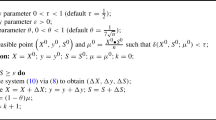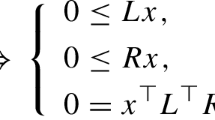Abstract
We present some generalizations of a homogeneous and self-dual linear programming (LP) algorithm to solving the monotone linear complementarity problem (LCP). Again, while it achieves the best known interior-point iteration complexity, the algorithm does not need to use any “big-M” number, and it detects LCP infeasibility by generating a certificate. To our knowledge, this is the first interior-point and infeasible-starting algorithm for the LCP with these desired features.
Similar content being viewed by others
References
I. Adler and D. Gale, “On the solutions of the positive semi-definite complementarity problem,” Technical Report ORC 75-12, Operations Research Center, University of California, Berkeley, CA (1975).
R.W. Cottle, J.-S. Pang, and R.E. Stone,The Linear Complementarity Problem, Computer Science and Scientific Computing (Academic Press, San Diego, 1992).
M. Kojima, S. Mizuno, and A. Yoshise, “An\(O(\sqrt n L)\) iteration potential reduction algorithm for linear complementarity problems,”Mathematical Programming 50 (1991) 331–342.
O. Güler and Y. Ye, “Convergence behavior of interior-point algorithms,”Mathematical Programming 60 (1993) 215–228.
Z. Luo and P. Tseng, “Error bound and convergence analysis of matrix splitting algorithms for the affine variational inequality problem,”SIAM Journal on Control and Optimization 2 (1992) 43–54.
O.L. Mangasarian and T.-H. Shiau, “Error bounds for monotone linear complementarity problems,”Mathematical Programming 36 (1986) 81–89.
S. Mizuno, F. Jarre, and J. Stoer, “A unified approach to infeasible-interior-point algorithms via geometrical linear complementarity problems.”Applied Mathematics and Optimization 33 (1996) 315–341.
R.D.C. Monteiro and S. Wright, “Local convergence of interior-point algorithms for degenerate monotone LCP,”Computational Optimization and Applications 3 (1994) 131–155.
F.A. Potra, “A quadratically convergent predictor-corrector method for solving linear programs from infeasible starting points,”Mathematical Programming 67 (1994) 383–406.
J. Renegar, “Some perturbation theory for linear programming,”Mathematical Programming 65 (1994) 73–92.
M.J. Todd and Y. Ye, “Interpreting the output of iterative infeasible-point algorithm linear programming,” Technical Report, School of ORIE, Cornell University, Ithaca, NY (1994).
Y. Ye, M.J. Todd, and S. Mizuno, “An\(O(\sqrt n L)\)-iteration homogeneous and self-dual linear programming algorithm,”Mathematics of Operations Research 19 (1994) 52–67.
X. Xu, P.-F. Hung, and Y. Ye, “A simplified homogeneous and self-dual linear programming algorithm and its implementation,”Annals of Operations Research 62 (1996) 151–172.
Author information
Authors and Affiliations
Additional information
Research supported in part by NSF Grant DDM-9207347, the University of Iowa Oberman Fellowship and the Iowa College of Business Administration Summer Grant. Part of this work is done while the author is visiting the Delft Optimization Center at the University of Technology, Delft, Netherlands, supported by the Dutch Organization for Scientific Research (NWO).
Rights and permissions
About this article
Cite this article
Ye, Y. On homogeneous and self-dual algorithms for LCP. Mathematical Programming 76, 211–221 (1997). https://doi.org/10.1007/BF02614384
Received:
Revised:
Issue Date:
DOI: https://doi.org/10.1007/BF02614384




